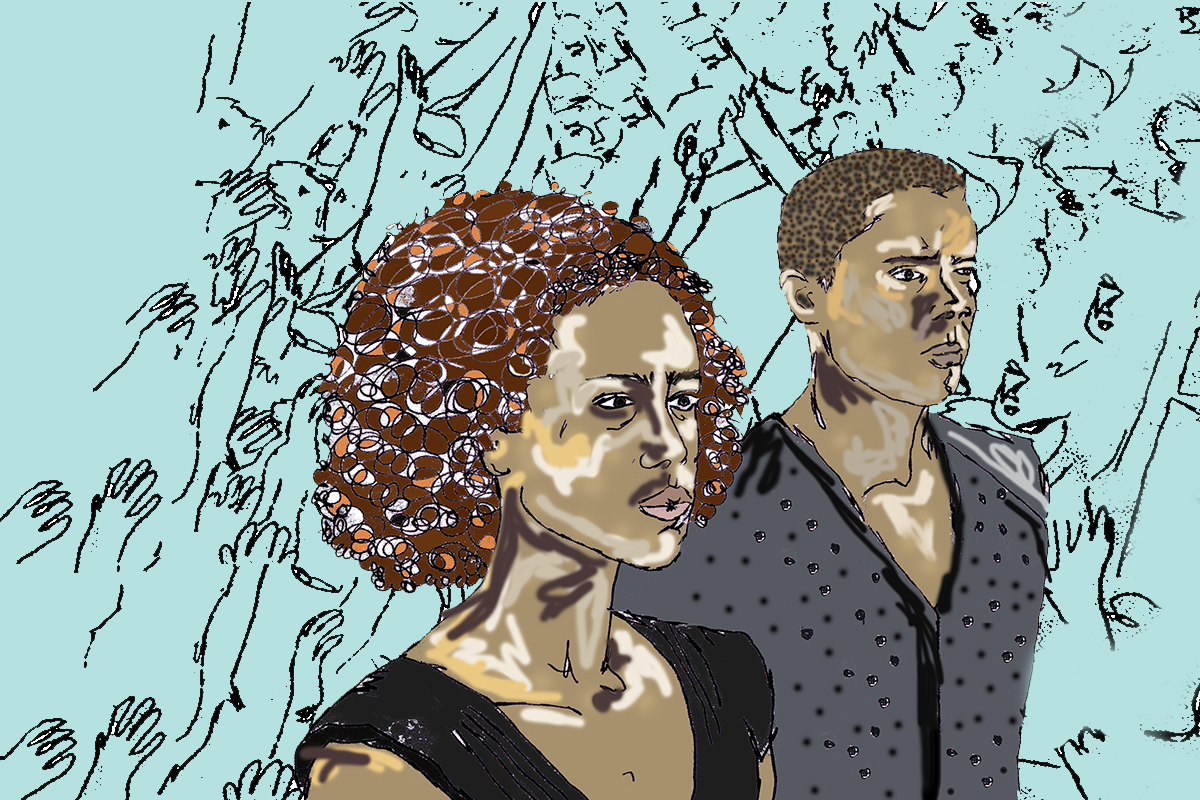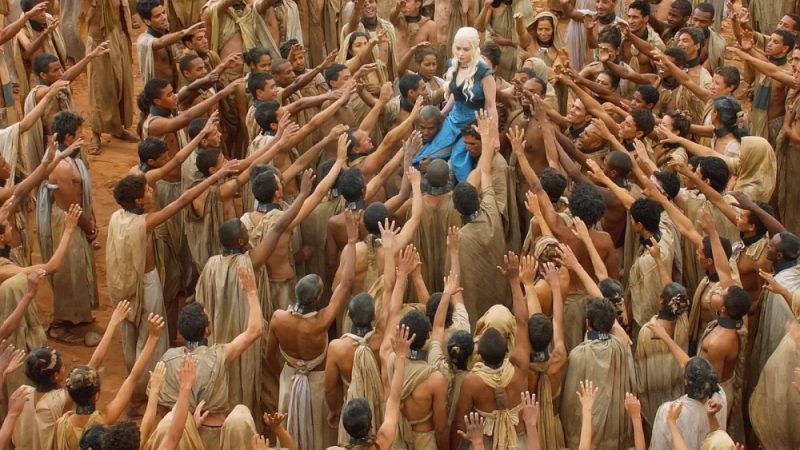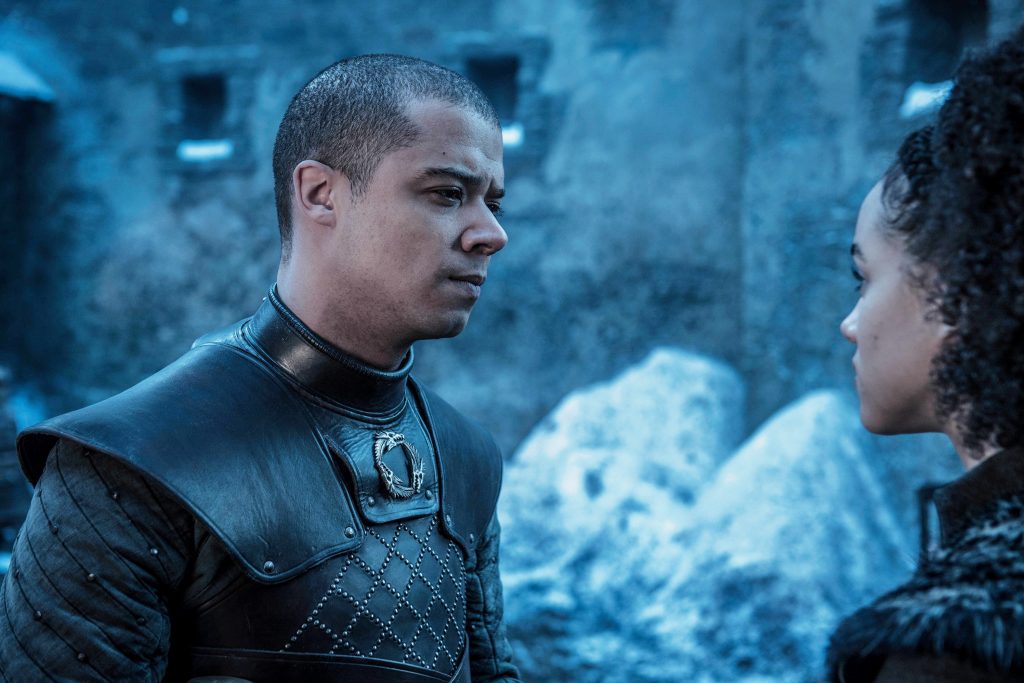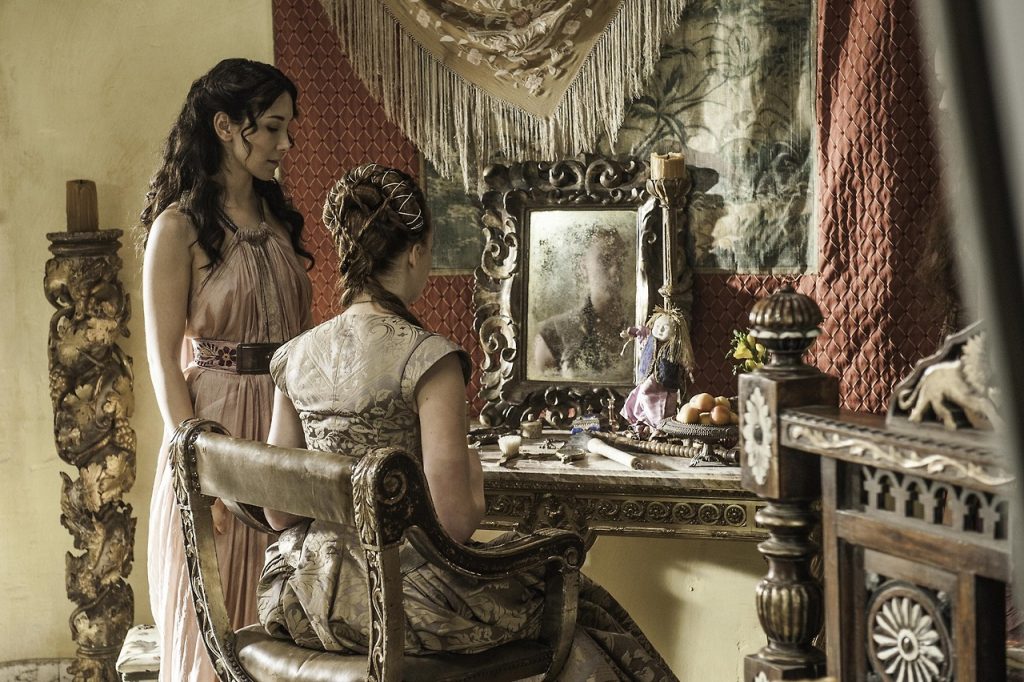
Game of Thrones is over, but I can’t forgive the show for its treatment of black and brown characters
Khadija Bajaber
21 May 2019
Illustration by Alice Z Jones
The audience of Game of Thrones has always had a split mind. When Daenerys Targaryen rose up at the climax of Season 3, floating on the bodies of brown and black people, people she has freed, people calling her “mother” – the general audience felt empowered, their hearts soared. But my stomach sank and a kind of uncomfortable unease settled over me. I didn’t see a saviour – I saw a sea of dark skin, making a bed for the ascension of a white woman without whom freedom would have been an impossibility.
Time and time again, the show’s creators have failed people of colour and used them to prop up white people. As someone who enjoys taking part in fandom discussion on other social media platforms, looking for criticism of any kind of art in predominantly white spaces is an exercise in brain deterioration. People of colour (PoC) have been talking about the problematic aspects of Game of Thrones for years, only for big media and locals to continuously erase these views, and thus erase us.
To be clear, I am a non-black person of colour, living in a predominantly African country – I am a writer of magical realism who is so nervous about doing a disservice to my own community in how I portray them, that I cannot fathom how David Benioff and D.B Weiss (D&D) have felt absolutely no responsibility in how they portray other cultures. Their writing has been consistently lazy and racist.
But before we go into the nuances of the show, I don’t want to let George R.R Martin off the hook. I’ve heard a few hot takes in my day. One of them being, “D&D suck, George R. R. Martin would never do brown and black people dirty like this!” My friend, my compadre. He has. He does. He will.
He has portrayed the Dothraki as rapist horse riding savaging ravagers who speak in a guttural tongue that, of course, isn’t meant to remind you of any kind of brown culture whatsoever.

So who are the people of colour who have been disregarded and dismantled throughout eight seasons of the show? If I remember their names, I’ll list them. Names are fun, but dying is more fun! Dying makes more narrative sense. And I don’t know, it just feels right somehow. Like, normal(ised). Anyway!
Mirri Maz Duur, the villain! We hate her because her village was attacked by the Dothraki who were trying to capture slaves to sell so they could fund Dany’s Uber ride to Westeros. We hate her for being raped by the Dothraki hordes (who are professional rapists, Game of Thrones won’t let you forget it!), we hate her for being angry about seeing her people, village and temple destroyed. She’s also evil for poisoning Daenerys’ buff, savage brown husband! We hate her and she deserved to be burned alive! Don’t forget, she is not a victim but a cruel and vengeful witch!
What else? Arab-coded slavers who do nothing but leer, spout woman-hatred, look sexually menacing (a stereotype Arab men experience in real life as well), and get killed by dragons in a master move by Daenerys. Daenerys then promised the Unsullied freedom if they fought for her – freedom of course being a notion they never could have fathomed before her, or achieved without her.
Khal Drogo rapes his child bride, but his child bride also falls in love with him. His funeral pyre literally hatches Daenerys dragons. We love a brown king who can donate his corpse to the white cause, yes!
Dothraki men? Rapists and thieves. Dothraki women? Expendable, no speaking roles. They’re graphically had sex with because… What else would they do? The Dothraki men prefer the white woman so much they award her the power, authority and respect that Dothraki women wouldn’t know what to do with in the first place!
“Daenerys has enjoyed the loyalty of the Dothraki without understanding or respecting any aspect of their culture”
The Dothraki men who don’t live to serve? Death by fire. In one instance, Dany comes out of a culturally sacred monument she just destroyed, and she’s like, fireproof. Let’s bow down because all our gods are war gods, and death is the only language we understand and deserve. There’s nothing we dote on, adore and deserve more than to be ruled by such a hand. Daenerys has enjoyed the loyalty of the Dothraki without understanding or respecting any aspect of their culture.
There was that one black guy who wanted to marry Daenerys, he gets to starve to death for his troubles. Another black guy, Salladhor Saan? Loved to talk about his lecherous desire for white queen Cersei, which isn’t a racist trope at all! He also disappeared, which considering his chances of survival, was probably for the best.
Missandei, arguably the most beautiful woman in the seven kingdoms, if not the world, is a highly qualified translator, trusted with no responsibility or power. She stands behind Daenerys – hands clasped, gaze low, contributing fascinating tidbits about gender-neutral High Valyrian prophecies. She’s an interpreter with other duties as well! Relied upon to attend to Dany, running baths, braiding hair. But Tyrion strolls in and is instantly head of the operation, despite Missandei having the qualifications, insight and background required to operate in this specific neighbourhood. But I’m sure Tyrion knows something we don’t, after all, drinking and knowing things is his M.O.
The Sand Snakes arc in the book is rife with Orientalism but is also a deeply important plot. In the show, they are the most mishandled part of the source material. Arianne who? They’re all over-sexualised and excruciatingly irritating because no thought was extended in expanding them beyond dying deaths no one cared about. In the book, when faced with the prospect of hurting Cersei’s only daughter Myrcella, Ellaria Sand refuses the cycle of vengeance. Ellaria in showverse kills Myrcella, but like, sexily. With poison lipstick. She joins Dany’s cause and subsequently gets tortured and killed by Cersei! White women listed as Cause of Death.
When Ellaria and her daughter get captured, Dany makes no effort to negotiate for their freedom, because why would she? Brown people got a beginning and they got, most importantly, speedily, an End. It’s implied that Dorne is still an ally to Daenerys despite her apparent disregard.

In the latest season of Game of Thrones, little has changed when it comes to how black and brown characters are treated.
Dany could have gone dark without Missandei needing to kick it. The Unsullied and Dothraki could have been shown interacting with one another instead of being faceless, pending corpses to fling into the path of white conflict. Do they not even communicate with one another? By the end of the season, their cold-eyed rampage against a mainly white populace affirms Cersei’s propaganda last season when she painted Dany’s army as savages. They could only have been empowered by realising the reality of their disempowerment, by throwing down their spears and refusing to fight in anyone’s name again, to go to Naath where they can protect one another and be free.
That would have been the only way to make some kind of amends for the enduring mistreatment of brown and black people in Game of Thrones. If you wanted Daenerys to feel alone, then have her brown and black allies abandon her. Yet it is their deaths that propel her descent into darkness, never their full, living, conscious decision to leave her. Brown and black people can’t have agency, can’t move the plot in a way that doesn’t sacrifice their own poorly written character arcs, which already exist in the service of a white character’s arc.
Greyworm tells Missandei in a poignant confession only in the mouth of a talented performer like Raleigh Ritchie, that he appreciated the fate that had befallen him for without it he would never have been a soldier for Daenerys, that he would never have met the beautiful Missandei (Nathalie Emmanuel) from the Island of Naath.
“The suffering of other (white) characters has built growth (disgusting) but also awarded power”
I have a lot of criticism about the show, but none about Nathalie and Raleigh, who have elevated the material and turned a relationship that wasn’t canon in the books into one of the most beautifully tender relationships on the show, with chemistry so entrancing one almost forgets audience intelligence is being insulted by tone-deaf writing again. It was maddening to see this relationship ending foreshadowed. I still hoped for a glimpse into a world where these characters could experience existence outside of servitude.
Greyworm confesses that he fears not death, but losing Missandei. So, therefore, he must lose Missandei. A beautiful tragedy? A slap to the face. Daenerys then giving Greyworm Missandei’s slave collar because it was the only worthy possession Missandei had, because Missandei carried it as an “empowering” reminder of her previous slavery, while also being unaware of her actual current existing we-don’t-call-it-slavery slavery? A punch to the gut. The strength the pair had could only be accessed through trauma and reminders of pain.
The suffering of other (white) characters has built growth (disgusting) but also awarded power. Daenerys led the Dothraki, Jon Snow gets title after title flung at him and Sansa is now the authoritative lady of Winterfell, Queen of the North. Meanwhile, until Dany’s death, Greyworm and Missandei’s job positions offered no upward mobility – and even in the scene where Bran the Broken is anointed, Greyworm is shown to be petulant and childlike, given no vote, no “aye” to accept the new king despite promise of new lands for his people.
Ultimately, there is not a single white person on this show who is not benefiting from the subjugation and othering of people of colour. Whether it’s the Starks now that the Southern downfall is clear, or Daenerys who uses brown and black bodies in a war against other white people until her dying breath.

Lilian R. Furst talks of fantasy in fiction as a mirror and it’s true that fantasy exists as a mirror into society. Missandei and Greyworm experienced racism, and throughout the show, we have seen gory, explicit dehumanising tropes, sexual violence and savagery. It has been allowed to do so and even congratulated when in reality, showing us the full ugliness of the world is not brave, rather the bare-minimum. Fantasy becomes destructive in the hands of two men whose brand is about how everyone you care about is going to die, that everything in futile, that nothing can change – and so it won’t.
But fantasy is about alternative realities, it is a contemplative reflection that makes readers and viewers look at the current, present and seemingly impossible realities of their own lives with new eyes. Good literature doesn’t have to teach moral lessons, but god, does Game of Thrones go out of its way to make sure we know that humanity is awful and grimdark, without challenging a single ounce of that grimdark awfulness? Without saying anything different?
“People of colour suffered in medieval times, women were raped a lot and didn’t have even a handful of rights”. These are the unquestionable realities of the world and so the writers excel in keeping those realities existent, giving them importance. In presenting no challenge to ugliness, their own ugliness goes unchallenged, and it silences all challenge to ugliness. Of course you wouldn’t get why D&D are so clever about presenting racism in a fictional universe, you’re not clever enough to understand the sexy nihilistic realities of the world, you absolute child.
In the books, power and agency is continuously explored. D&D put a black person on their show so that they could die, and we’re supposed to pretend this is groundbreaking commentary about race in medieval fantasy worlds, and also our realities.
“Lord of the Rings was whiter than white, and upon reflection, I am so grateful that it is. I no longer trust our bodies in the hands of white people”
Lord of the Rings was whiter than white, and upon reflection, I am so grateful that it is. I no longer trust our bodies in the hands of white people. We are kindling for the fire, our honour to be ashes, our honour and great duty is death and barbarity.
The show’s irresponsibility comes not from an obvious, sinister hatred of people of colour, but pure ignorance. They think that insightful writing is telling it “as it is”. Assuming, like many white creators before them, that the audience is fools who won’t know lazy, selfish writing when they see it. Black and brown bodies have always been a means to an end and the show is frankly masturbatory in how it feeds into the writers’ egomania, “touching” upon issues of race with zero interest in having diversity in the writer’s room.
They didn’t know what to do with a black body if it wasn’t to kill it, disappear it and prop white characters on its corpse. They have prioritised twists over character development and gory, shoe-horned in deaths as plot points that further another character’s storyline while closing much-needed points of view. The misogynoir was no longer shocking, it was expected.
Now Game of Thrones is over, the losers are the audience, who were genuinely (somehow) blindsided by the ending. But it is part of an established pattern. We must make like the Unsullied and Dothraki, returning home without glory after having our time and lives wasted in caping for white agendas. We must die, and if we live? We must step out of the story and off stage, our purpose now completed.
In the end, the show gave me more than I let it take; I met the best people and got a peek into the great, living world of fandom. I will be looking forward to the books and the return of my favourite characters – because you can love what you love, and not be blind.
But, in a world of ice zombies and dragons, fire priestesses and giants, direwolf gangs and green tree people – the real and impossible fantasy is the existence of a person of colour who doesn’t owe their life and death to a white person.









